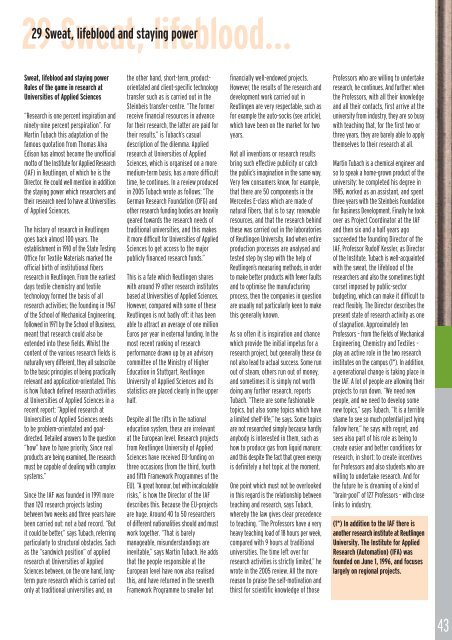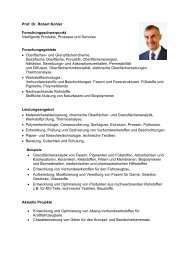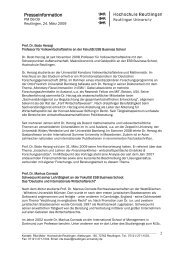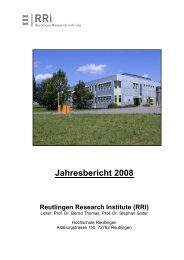Campus - Reutlingen - University - Magazine - Hochschule ...
Campus - Reutlingen - University - Magazine - Hochschule ...
Campus - Reutlingen - University - Magazine - Hochschule ...
Sie wollen auch ein ePaper? Erhöhen Sie die Reichweite Ihrer Titel.
YUMPU macht aus Druck-PDFs automatisch weboptimierte ePaper, die Google liebt.
29 Sweat, lifeblood…<br />
29 Sweat, lifeblood and staying power<br />
Sweat, lifeblood and staying power<br />
Rules of the game in research at<br />
Universities of Applied Sciences<br />
“Research is one percent inspiration and<br />
ninety-nine percent perspiration”. For<br />
Martin Tubach this adaptation of the<br />
famous quotation from Thomas Alva<br />
Edison has almost become the unofficial<br />
motto of the Institute for Applied Research<br />
(IAF) in <strong>Reutlingen</strong>, of which he is the<br />
Director. He could well mention in addition<br />
the staying power which researchers and<br />
their research need to have at Universities<br />
of Applied Sciences.<br />
The history of research in <strong>Reutlingen</strong><br />
goes back almost 100 years. The<br />
establishment in 1910 of the State Testing<br />
Office for Textile Materials marked the<br />
official birth of institutional fibers<br />
research in <strong>Reutlingen</strong>. From the earliest<br />
days textile chemistry and textile<br />
technology formed the basis of all<br />
research activities; the founding in 1967<br />
of the School of Mechanical Engineering,<br />
followed in 1971 by the School of Business,<br />
meant that research could also be<br />
extended into these fields. Whilst the<br />
content of the various research fields is<br />
naturally very different, they all subscribe<br />
to the basic principles of being practically<br />
relevant and application-orientated. This<br />
is how Tubach defined research activities<br />
at Universities of Applied Sciences in a<br />
recent report: “Applied research at<br />
Universities of Applied Sciences needs<br />
to be problem-orientated and goaldirected.<br />
Detailed answers to the question<br />
“how” have to have priority. Since real<br />
products are being examined, the research<br />
must be capable of dealing with complex<br />
systems.”<br />
Since the IAF was founded in 1991 more<br />
than 120 research projects lasting<br />
between two weeks and three years have<br />
been carried out: not a bad record. “But<br />
it could be better,” says Tubach, referring<br />
particularly to structural obstacles. Such<br />
as the “sandwich position” of applied<br />
research at Universities of Applied<br />
Sciences between, on the one hand, longterm<br />
pure research which is carried out<br />
only at traditional universities and, on<br />
the other hand, short-term, productorientated<br />
and client-specific technology<br />
transfer such as is carried out in the<br />
Steinbeis transfer-centre. “The former<br />
receive financial resources in advance<br />
for their research, the latter are paid for<br />
their results,” is Tubach’s casual<br />
description of the dilemma. Applied<br />
research at Universities of Applied<br />
Sciences, which is organised on a more<br />
medium-term basis, has a more difficult<br />
time, he continues. In a review produced<br />
in 2005 Tubach wrote as follows: “The<br />
German Research Foundation (DFG) and<br />
other research funding bodies are heavily<br />
geared towards the research needs of<br />
traditional universities, and this makes<br />
it more difficult for Universities of Applied<br />
Sciences to get access to the major<br />
publicly financed research funds.”<br />
This is a fate which <strong>Reutlingen</strong> shares<br />
with around 19 other research institutes<br />
based at Universities of Applied Sciences.<br />
However, compared with some of these<br />
<strong>Reutlingen</strong> is not badly off: it has been<br />
able to attract an average of one million<br />
Euros per year in external funding. In the<br />
most recent ranking of research<br />
performance drawn up by an advisory<br />
committee of the Ministry of Higher<br />
Education in Stuttgart, <strong>Reutlingen</strong><br />
<strong>University</strong> of Applied Sciences and its<br />
statistics are placed clearly in the upper<br />
half.<br />
Despite all the rifts in the national<br />
education system, these are irrelevant<br />
at the European level. Research projects<br />
from <strong>Reutlingen</strong> <strong>University</strong> of Applied<br />
Sciences have received EU-funding on<br />
three occasions (from the third, fourth<br />
and fifth Framework Programmes of the<br />
EU). “A great honour, but with incalculable<br />
risks,” is how the Director of the IAF<br />
describes this. Because the EU-projects<br />
are huge. Around 40 to 50 researchers<br />
of different nationalities should and must<br />
work together. “That is barely<br />
manageable, misunderstandings are<br />
inevitable,” says Martin Tubach. He adds<br />
that the people responsible at the<br />
European level have now also realised<br />
this, and have returned in the seventh<br />
Framework Programme to smaller but<br />
financially well-endowed projects.<br />
However, the results of the research and<br />
development work carried out in<br />
<strong>Reutlingen</strong> are very respectable, such as<br />
for example the auto-socks (see article),<br />
which have been on the market for two<br />
years.<br />
Not all inventions or research results<br />
bring such effective publicity or catch<br />
the public’s imagination in the same way.<br />
Very few consumers know, for example,<br />
that there are 50 components in the<br />
Mercedes E-class which are made of<br />
natural fibers, that is to say: renewable<br />
resources, and that the research behind<br />
these was carried out in the laboratories<br />
of <strong>Reutlingen</strong> <strong>University</strong>. And when entire<br />
production processes are analysed and<br />
tested step by step with the help of<br />
<strong>Reutlingen</strong>’s measuring methods, in order<br />
to make better products with fewer faults<br />
and to optimise the manufacturing<br />
process, then the companies in question<br />
are usually not particularly keen to make<br />
this generally known.<br />
As so often it is inspiration and chance<br />
which provide the initial impetus for a<br />
research project, but generally these do<br />
not also lead to actual success. Some run<br />
out of steam, others run out of money,<br />
and sometimes it is simply not worth<br />
doing any further research, reports<br />
Tubach. “There are some fashionable<br />
topics, but also some topics which have<br />
a limited shelf-life,” he says. Some topics<br />
are not researched simply because hardly<br />
anybody is interested in them, such as<br />
how to produce gas from liquid manure:<br />
and this despite the fact that green energy<br />
is definitely a hot topic at the moment.<br />
One point which must not be overlooked<br />
in this regard is the relationship between<br />
teaching and research, says Tubach,<br />
whereby the law gives clear precedence<br />
to teaching. “The Professors have a very<br />
heavy teaching load of 18 hours per week,<br />
compared with 9 hours at traditional<br />
universities. The time left over for<br />
research activities is strictly limited,” he<br />
wrote in the 2005 review. All the more<br />
reason to praise the self-motivation and<br />
thirst for scientific knowledge of those<br />
Professors who are willing to undertake<br />
research, he continues. And further: when<br />
the Professors, with all their knowledge<br />
and all their contacts, first arrive at the<br />
university from industry, they are so busy<br />
with teaching that, for the first two or<br />
three years, they are barely able to apply<br />
themselves to their research at all.<br />
Martin Tubach is a chemical engineer and<br />
so to speak a home-grown product of the<br />
university: he completed his degree in<br />
1985, worked as an assistant, and spent<br />
three years with the Steinbeis Foundation<br />
for Business Development. Finally he took<br />
over as Project Coordinator at the IAF<br />
and then six and a half years ago<br />
succeeded the founding Director of the<br />
IAF, Professor Rudolf Kessler, as Director<br />
of the Institute. Tubach is well-acquainted<br />
with the sweat, the lifeblood of the<br />
researchers and also the sometimes tight<br />
corset imposed by public-sector<br />
budgeting, which can make it difficult to<br />
react flexibly. The Director describes the<br />
present state of research activity as one<br />
of stagnation. Approximately ten<br />
Professors – from the fields of Mechanical<br />
Engineering, Chemistry and Textiles –<br />
play an active role in the two research<br />
institutes on the campus (1*). In addition,<br />
a generational change is taking place in<br />
the IAF. A lot of people are allowing their<br />
projects to run down. “We need new<br />
people, and we need to develop some<br />
new topics,” says Tubach. “It is a terrible<br />
shame to see so much potential just lying<br />
fallow here,” he says with regret, and<br />
sees also part of his role as being to<br />
create easier and better conditions for<br />
research, in short: to create incentives<br />
for Professors and also students who are<br />
willing to undertake research. And for<br />
the future he is dreaming of a kind of<br />
“brain-pool” of 127 Professors – with close<br />
links to industry.<br />
(1*) In addition to the IAF there is<br />
another research institute at <strong>Reutlingen</strong><br />
<strong>University</strong>. The Institute for Applied<br />
Research (Automation) (IFA) was<br />
founded on June 1, 1996, and focuses<br />
largely on regional projects.<br />
43






